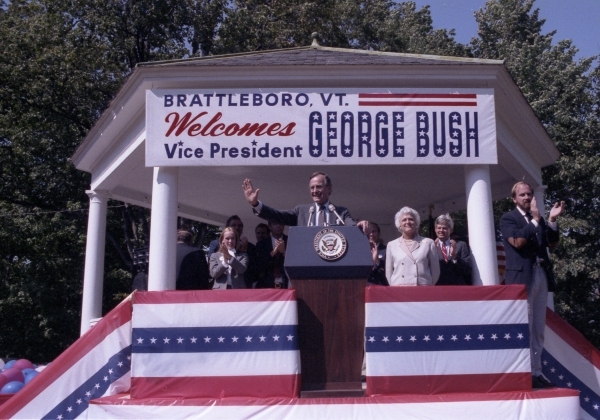For the people whose countries or lives were destroyed by George H. W. Bush's violent actions, he'll always be a monster.
Here are a few of the many reasons why, beneath the civility, Bush was a detestable president.
Bush was a Texas congressman, CIA director under President Gerald Ford, vice president for President Ronald Reagan, and served one term as 41st president of the United States. During his 30 years of service, he faced criticism for coming out against the Civil Rights Act of 1964 while running for the U.S. Senate and for his support of the Vietnam War.
As president, he filled the Supreme Court seat of civil-rights titan Thurgood Marshall with Clarence Thomas. And now we have another entitlement Yale Skull and Bones Supreme Court justice with Brett Kavanaugh.
In 1987, while vice president under Reagan, Bush conspired to deceive and defy Congress with an illegal arms sale to Iran in exchange for securing the release of American hostages in Lebanon. The proceeds from the sale were used to illegally fund the Nicaraguan Contras. In 1992, Bush pardoned six Iran-Contra defendants.
I personally saw the devastating effects of the war in Nicaragua in 1987 as a member of Witness for Peace. I saw health clinics and schools destroyed, bridges and roads blown up, and people killed.
As we left Nicaragua and flew into Miami, we saw a plane flying a banner, which said, “Oliver North is a hero.”
Recently, the Nicaraguan contras have re-emerged with the military support of the U.S. Will another major war follow, or has it already begun? Please note: Bush instigated the death squads throughout Central America in the 1980s.
* * *
Let's not forget the Willie Horton ad in the presidential campaign of 1988.
Bush's team featured images of Horton, a black man serving a life sentence for a felony murder conviction who escaped from custody while on a weekend furlough from prison; he went on to rape a white woman and brutally assault her fiancé. The governor who signed the furlough was Bush's Democratic opponent, Michael Dukakis.
Then-President Ronald Reagan, as California governor, had also signed identical furlough requests. But the Bush team made this furlough central to the campaign using blurry, high-contrast images of Horton, images that resembled wanted posters for runaway slaves in the antebellum South.
The success of the ad campaign spurred a generation of race-baiting ads by Republican candidates who have picked at the nation's festering racism and undermined racial justice. Guided by Newt Gingrich, the new racist campaigns used coded us-versus-them language to provide a veneer of plausible deniability to otherwise-racist messages.
Republican National Committee Chair Lee Atwater, before dying in 1991, apologized for the Willie Horton campaign ad.
Bush never did.
* * *
On Dec. 20, 1989, Bush launched Operation Just Cause to execute an arrest warrant against Panamanian leader Manuel Noriega, once a close U.S. ally, on charges of drug trafficking. During the attack, the United States unleashed a force of 24,000 troops equipped with highly sophisticated weaponry and aircraft against a country with an army smaller than the New York City Police Department. The Panama invasion served as a template for future U.S. military interventions and a precursor to the first Gulf War.
The invasion of Panama took place a month after the fall of the Berlin Wall, and it really set the terms for future interventions in a number of ways.
One, it was unilateral. It was done without the sanction of the United Nations and Organization of American States. It violated national sovereignty, which, of course, the United States did often during the Cold War.
The Pentagon said hundreds of people died in this attack; Panamanians said it was 3,000 people. How long did it last? In the first hour, hundreds of bombs were dropped after midnight, devastating poor neighborhoods while those of the elite were protected.
The Inter-American Commission on Human Rights stated that the U.S. owed reparations to Panama over Bush's Invasion.
And so we have another chapter in Bush's dark legacy.
Sanitizing his story amounts to historical revisionism.
